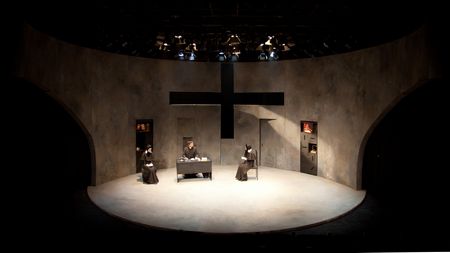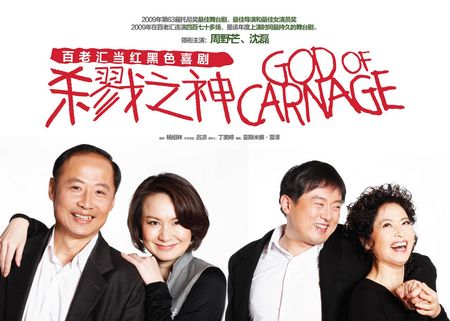Found in translation
 |
|
A scene from the stage version of Doubt. Photos: Courtesy of Shanghai Drama Art Center |
 |
|
A scene from God of Carnage. |
"First, I read the play thoroughly, and then study the playwright and his or her background. Next, I see the play being staged, or watch a video of a performance." This is the routine that Hu Kaiqi, a New York-based Chinese translator follows when he takes on the job of translating an English-language play into Chinese.
"I insist on maintaining the play's artistic integrity, while ensuring it is still dramatic and 'performable,'" Hu told the Global Times. "But I also feel it's a process of re-creating in some way."
Broadway blockbusters
For the ongoing Awarded Western Contemporary Drama Season 2011 at the Shanghai Drama Art Center (SDAC), Hu has translated three of the eight productions: Doubt, God of Carnage and Proof. All three are former Broadway blockbusters, winning a handful of Tony Awards and Pulitzer Prizes between them.
Among Hu's other identities are that of a visiting professor at the Shanghai Theater Academy (STA) and a British and American drama advisor at the National Theater of China (NTC) in Beijing.
Besides the three aforementioned plays, Hu has also translated Copenhagen, The Love of the Nightingale, and The Censor into Chinese and all have appeared on either the Beijing or Shanghai stage, the two main markets for Western contemporary dramas.
Hu translated Copenhagen - about the World War II meeting between the physicists Niels Bohr and Werner Heisenberg - 12 years ago at the request of the STA.
"It was the first and, I think, most successful work I've ever translated, and it is also my favorite piece," he said. "I like its dramatic structure, philosophical meaning, and its poetic language."
Doubt, the 2004 American play by John Patrick Shanley, is about a nun who harbors deep suspicions about a priest she works with. Later an Oscar-nominated film starring Meryl Streep and Philip Seymour Hoffman, Doubt has had two Chinese productions: one for the NTC and the other produced by SDAC, both rapturously received.
"What does this mean? It means Chinese audiences are longing for the plays. However, the translation - especially the style of these Western dramas - is usually the difficult part to deal with," said Hu.
He shared some of his experiences about working on Doubt. "There is a line in the play, that is from Ecclesiastes, in the Bible: 'In much wisdom is much grief: and he that increases knowledge increases the sorrow.' I chose to translate this into a classical Chinese style, thus: '大智则大悲:知识愈多者忧患愈多。— 传道书》'"
 0
0 







Go to Forum >>0 Comments